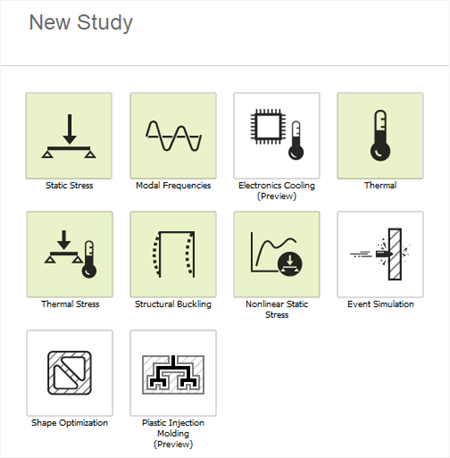Working with Ansys
If you have Ansys® Mechanical™ 2021 R1 or later, or Ansys® Discovery™ 2021 R1 or later installed on your computer, you can send one of the Fusion Simulation studies highlighted in green below, directly into them, for further analysis.
Alternatively, if you want to create a Fusion Simulation data file that can run in those Ansys products, export your study from the Simulation Workspace as a Fusion Simulation data (.sdz) file. You or your collaborators can then import the .sdz file into the Ansys products.

Figure 1: Studies you can export to Ansys
Limitations
The following study settings are not imported into Ansys, and must be recreated, manually, on import where appropriate:
Mesh settings
- Adaptive mesh refinement and other mesh settings
- Local mesh control
Loads and constraints
- Bolt connector mass
- Heat source load on edges
- Remote moment
- Rigid body connector
Material properties
- Temperature dependent internal heat loads
- The material temperature-dependent yield, and ultimate tensile strength
- Combined (Isotropic and Kinematic) Hardening rule for non-linear materials
- Elastoplasticity and plasticity with Tresca, Mohr-Coulomb or Drucker-Prager yield criteria
- Nonlinear material elasticity
Additional limitations in Ansys Discovery
- Fixed constraints on edges and vertices are ignored
- Hydrostatic pressure loads are created, with a warning, as loads with zero pressure
- The acceleration and velocity components of Angular global loads are ignored, with a warning
- Edge contact locations are ignored, with a warning
- Thermal Radiation loads are ignored, with a warning
- Bolt Connector objects are created, but with a warning, because the location is approximate and will not produce valid simulation results
- Only isotropic, constant property material definitions are supported. Any temperature dependent, nonlinear or hyper-elastic material definitions are ignored, with warnings